
This review may contain spoilers
A K-Drama Examining Unhealthy Relationships and Going against the Grain?
There's something to be said about a series that seems to be angling to be a critique of what is all too common in K-Dramas, or the romantic genre period. Rewarding the asshole, and sweeping their behavior under the rug, because that's what you do or expect."Nevertheless" is a fairly frustrating series to watch. The indecisiveness of the lead, and the manipulation of the love interest, made me want to throw objects at my television and computer screen. It was enough that I stopped watching the series in 2021 or so before deciding to resume in 2023.
In one instance, the writing appears self-aware enough not to play into the common cliches of K-Dramas, while at the same time playing right into them. By that I mean, Na-Bi's indecisiveness, or emotional vulnerability, and allowing herself to be strung along by Jae-Eon, while at the same time knowing that none of what's going on between them is sincere in the least (but she wants it to be real).
With Jae-Eon, it's clear that the script wants to play heavily into the "sympathy for the devil" angle with his character. That his reasons for being flighty, mean-spirited, and typically dishonest with the women he's with, is some act of self-protection. But it's hard to feel any empathy for his character when so much of what comes out of his mouth is dishonest or a half-truth. As the series progresses, his poessiveness and minimization of Na-Bi's feelings, and her relationships with other people (other men, really) don't do anything but want me to see her far, far away from him.
The supporting cast all appear to be sounding boards for Na-Bi's conscious and critical thinking skills that she's not using. They all see her going down a real self-destructive path by remaining with Jae-Eon, but they can only tell her how they feel about it, and ask her, "Do you really think this person is being honest with you?" And of course, Na-Bi remains indecisive and chooses not to listen to her instincts, even as Jae-Eon begins to mirror her ex-boyfriend (who made a sculpture of her in a sex position, for public viewing, without her consent) more and more.
The end of the show really seems to bring all the emotional turmoil together in the ninth and tenth episodes, where, after being emotionally yanked around by Jae-Eon, Na-Bi finally snaps and lays down the law. She won't allow this dude to manipulate her anymore, even if he decides to be honest and tell her that he has genuine feelings for her. And, for me, that would've been enough to give this series high markings, a 10/10. A K-Drama that doesn't feed into the bad feedback loop of "asshole gets the girl".
But, the show dismantles itself by pairing Na-Bi and Jae-Eon together in the end. And all because of a plot thread that would make it seem like their relationship is the stuff of "Star-crossed lovers". The show even appears to know that it's absolutely bonkers for Na-Bi to be with Jae-Eon. A line by the way of "I'll worry about that later" only seems to exist to dismiss arguments.
Overall, despite some stellar performances, the writing lets down what might've been a pretty solid drama. It's fairly reflective of the idea that something in the culture of South Korea really doesn't want to hold assholes like Jae-Eon accountable, because, not unlike the United States, so many of those types are the ones that get idolized as the ideal person.
Was this review helpful to you?
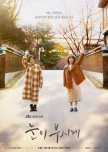
This review may contain spoilers
In Which Time Traveling gets Fairly Angsty about the Passage of Time
"The Light In Your Eyes" is a fairly deceptive take on a woman suffering from Alzheimer's disease that fits pretty well into the how the disease robs people of their memories and sense of self by exploring the idea of an imagined life. Before that, the series masquerades a time travel rom-com about an aspiring announcer who uses a watch that can manipulate time, but accelerates her aging as a price.While not comparable to the likes of Sarah Polley's "Away From Her", the show - toward the end - does get pretty heavy once it reveals it hand and deals with the subject on more than a passing level. If the aim was always to tell a story about aging and how the elderly are treated by their community (on a whole), then hiding it behind a fluffy rom-com was certainly one way to see it through.
However, it gets to a point where that I think the constant barrage of melodrama honestly detracts from the message, and borders on comical (unintentionally) at times.
There aren't a lot of dramas I'd recommend, but if I had to choose a show for someone to watch, I'd choose this one (on the pretense that I'd spoil the twist, because I think knowing beforehand will simply make the story better).
Now if y'all excuse me, I'm gonna watch a salary man fight zombies. I'm sure that won't break my heart.
Was this review helpful to you?

This review may contain spoilers
A Solid Melodrama Hampered by Cenorship and Comrpomise
It's hard to believe that anyone watching "Better Days" would miss that the story was clearly critical (condemnatory) of the toxic culture around the education system. A system that suggests that you're weak for failing, and that it's all about not failing your parents. Not that it's own approach to learning has severely damaged its youth and their ability to empathize with their fellow peers.At least, that's how I interpreted the suicide (of Hu Xiao Die) that's the catalyst for the film. So the hard swerve into hyper-focusing on school bullying alone, and attributing the death solely to that (while there are giant signs condemning children for not being perfect in school, contrasted against security gates lining the school balcony) was tone deaf to me. "We just gon' pretend that the school system wasn't also responsible for this?"
Reading up the film (Hollywood Reporter) certainly clarified things for me. Chen Nian's story lost a lot of context with the removal of most of her mother's subplot, which seemed to tie her directly to way Liu Bei Shan made a living in the absence of his mother.
Still, even with all this knowledge at the forefront of my mind, I don't think the film in its present form is terrible (hoping a fool's hope that an uncut version surfaces at some point). Even if the film never condemns the education, or the parents, or the financial straits that lands Chen's mother in a bad place, their actions are a damning document on how it harms the children (who act out that trauma on their peers, driving them to death, until it's eventually visited upon them).
But I suppose that kind of messaging only works if the audience intended actually sees it for what it is (and from what I read about it, that flew over everyone's heads).
If the film falls off the rails, it's when it becomes about the sudden murder of the comically cruel school bully (Wei Lai) and how the two characters deal with it. As something buffered against the hyper nationalistic "we shall prevail" exam scene, it comes out of nowhere. When did this happen? Why was this considered important enough to dwell on, but not important to actually see happen on-screen?
We don't get explanation until the last hour of the film (it was an accident spurred on by rage, and the Wei Lai's inability to leave Chen alone). The structure, for lack of a better word, throws the pacing of the film off completely because it's looking to surprise the audience with a brief whodunit. This is something we should've seen in real time (chronological order). The rest of the film is a melodramatic drag race to the conclusion of the film that sees both characters arrested (like some moralistic twist straight outta the hayes code).
What holds the film up, for the most part, are the performances of the leads (Zhou Dong Yu and Jackson Yi), and the development of their kinship. I believed these two strangers would form a rocky friendship as a means of coping their toxic environments. But for a film that's two hours and some change, I don't feel like more attention was given to their dynamic.
However strong Yu and Yi's chemistry is, Chen and Bai's relationship feels rushed. A lot of the film was really hyper-focused on how Chen was terrorized by her peers, almost gratuitously. And if they wanted me to empathize with Wei Lai, why was more time not afforded to her side of the narrative instead of dumped at the end of the film?
I wish that the director (Derek Tsang) never pursued a release in mainland China, because its sounds likes the guy's work was put through the ringer of a completely avoidable situation.
Was this review helpful to you?

Like everyone is saying (on Letterboxd), "The Suspect" is a film that feels heavily influenced by the Paul Greengrass's "Bourne" films ("Supremacy" and "Ultimatum").
It's six years (circa 2013) too late to be accused of jumping on the hype train (like other American films, ah-la "Taken") and six years too old to be anything particularly entertaining or thrilling if you've seen the Bourne films and its imitators later down the line before this.
Despite being headlined by Gong Yoo (who, lathered up in the most egregious fake-n-bake, feels miscast as the stoic North Korean defector), I can't really find anything particularly positive to say about the film outside of its production values.
"The Suspect" lacks any of the subtlety or even so-called anti-government sentiment that Greengrass's "Bourne" films were accused of. If "Supremacy" and "Ultimatum" could be perceived as an indictment against American foreign policy because of their unflattering depiction of the US Government, "The Suspect" is rather the opposite despite featuring antagonists with government positions.
More to the point, I feel like I've been dropped into the middle of a story that had a film preceding this film's story. What's going and why I should exactly be rooting for or against anyone is a bit difficult to suss out even when I think I've gotten a handle on things.
Was this review helpful to you?
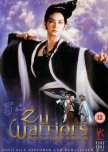
"Zu: Warriors From the Magic Mountain" has the distinction of being known as the film that inspired John Carpenter's 1986 fantasy film, "Big Trouble in Little China". Now that I have that context, the influence of this film is fairly evident throughout "Big Trouble in Little China". Not the blatant orientalism (a specifically western problem), but just how muddled and convoluted it is as a narrative "in middle of things", and as a visual effects film.
Sammo Hung is in this movie and they have him dressed like a fifth century Mario Luigi. The fate of billions depend on a bunch of kids who have to save the world from the devil because the adults are too busy drawing lines in the sand! Easily as you could sum this movie with a basic "Character A and Character B do [blank]", watching it in real time reveal a story that tends to be hard to follow and piece together.
The enthusiasm that went into the film's special effects is pretty clear from the jump, it's just a shame that none of that energy translated to the greater narrative. Fun as it is to watch the characters kind've fumble their way through one event after another, none of the characters really leave a lasting impression on you. Performances as a serviceable as they can be in a film like this, and certainly do enough to maintain the goofiness of the story.
If you've never seen this film before, but might've heard about it, give it a chance. You might have fun.
Was this review helpful to you?
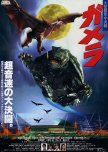
Shusuke Kaneko and Kazunori Itō were given the monumental task of reimagining what was largely considered a “Godzilla knockoff” (and a cheap one at that) aimed at children, and getting a 90s audience to buy into the idea of a giant turtle monster fighting prehistoric (manufactured) birds of prey.
For everything Daiei Films’ "Gamera: Guardian of the Universe" had going against it (including its director being a Godzilla stan dying to direct a "Godzilla" film), Kaneko and Itō craft an origin story that capitalizes Gamera’s relationship with children (a teenager in this case) without becoming an overly confectionery narrative (ah-la "Gamera The Brave").
The movie balances the tones of humor, horror, and drama and features some of the best set and suit design for a mid-90s giant monster film. This is the kind of reboot "Godzilla 2014" wanted to be for Godzilla, but never achieved.
Was this review helpful to you?
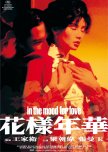
A Frustrating Experience
[Watched/Reviewed on Letterboxd 5/16/2021]So far, outside of "Chungking Express", Wong Kar-wai's filmography has been fairly aggravating to watch. Clearly, the guy's modus operandi is the interior lives of unhappy people, but with the way people talked about his films, I was hoping for something with a little more substance than folks who clearly need to learn how to communicate with each other.
It's just been Tony Leung portraying sorry men in even sorrier relationships featuring actors I've only come to like (Leslie Cheung) and already love (Zhang Ziyi, Maggie Chung, Gong Li, and Faye Wong). It's a kind of director/actor dynamic that's proven to be less than stellar, and certainly not entertaining.
Of all his films, I was really expecting to like "In The Mood For Love", if only for my girl Maggie Cheung. The establishing period of the film is really good, I like the way the film sets the characters up as neighbors. It's kind've amusing that we're never allowed to see the faces of their beau's, only hear them speaking (clearly, someone watched "Charlie Brown").
But as the film goes on, it just feels aimless as it languishes in the growing loneliness of the characters. I struggled to remain awake just to see the two interact, but it got to a point that I didn't care anymore. I rolled over and went to sleep wishing they'd divorce their spouses so they can be "[Un]happy Together".
Was this review helpful to you?
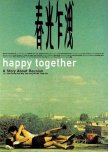
A gorgeous looking film about two men who don't love (or like) each other (anymore), but are too comfortable in their particular ruts to really admit it to each other (or themselves).
Solid performances all round, but I just didn't care about the characters or the wild swings in their crumbling dynamic.
And Now that I've seen it, the constant comparison to Barry Jenkins' "Moonlight" feels incredibly misguided or wrongheaded (even if this film was an explicit influence).
Was this review helpful to you?

"Hidden Fortress" is a little like "Yes, Madam!" The sense that the headline stars (reviews spent so much time hyping up) with the traditional straight-man roles, are sort've secondary to a tale of a comedic odd couple. The pair who fumble their way through circumstances grander than them.
I can definitely see the influence it had on "Star Wars", and with this in hindsight, George Lucas's film feels like a dilution of Hidden Fortress's less flashy approach to storytelling.
Was this review helpful to you?
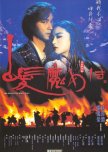
This review may contain spoilers
[Watched/Reviewed on Letterboxd 5/03/2021]One of the influences behind "Xena: Warrior Princess" (and "Mortal Kombat 3"), "The Bride with White Hair" feels more like a lead-in to a more substantial story than a narrative unto itself.
The literal Bride with White Hair doesn't show up until the climax of the film, something that feels altogether rushed, but no less satisfying as a conclusion to the film that is basically a flashback setting up events for its sequel, "The Bride With White Hair II".
The film is supported primarily by its flair, 'wuxia choreography', and visual style. Outside a reliance on anti-Black and anti-indigenous stereotypes (actors walking around in outfits seemingly inspired by the Tiki villain in ,"Scooby Doo," and brownface), the film's soft lit, dreamy cinematography works for the almost fairy-tale approach to the story.
It communicates just enough about its lead characters (Cho Yi-Hang and the wolf-girl, Lian Ni Chang), and the ideology of their supporting cast that, even with how rushed things turned out, the story isn't a clear cut tale of good and evil.
It's a solid example of what happens when vendettas and tribalism turn communities on each other. It's just a shame that the story never tried to build Cho Yi Hang and Lian Ni Chang's relationship to explore that rift outside their apathy or objection to war altogether. Most of their screen-time is wasted on soft-core (porn) sex scenes in the water.
Was this review helpful to you?
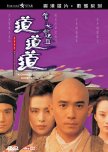
A 'Sequel' that Ends up Spinning its Wheels
[Watched/Reviewed on Letterboxd 5/13/2021]"Basically a retelling of A Chinese Ghost Story" Amazon Prime nakedly claims in its summation of the film. Whoever wrote the summary is not wrong in the least, but now the ghost dame likes being evil, and its Monk protagonist is genre savvy to ghosts.
It's kind've disappointing when you consider how many ways from Sunday you could tell a continue a "Chinese Ghost Story", but sometimes folk just become a bit too taken with their first idea to break away from it.
Was this review helpful to you?
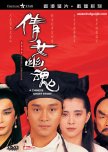
So that's where "Xena: Warrior Princess" got it from!
[Watched/Reviewed on Letterboxd 5/12/2021 ]There's a lot about "A Chinese Ghost Story" that feels improvised (less so than its sequel, which felt all over the place) as it follows a down-on-his-luck and wayward scholar (who doesn't do much scholarly work), and becomes swept up in a supernatural tryst with a ghost forced to kill human beings to appease a tree demon. It's a good kind've improvisation, though.
The apparent influence of Sam Raimi's "Devil Dead (1981)" is hard to ignore, which makes A Chinese Ghost Story's influence on "Xena: Warrior Princess" (that underwater kiss between Xena and Lao Ma in "The Debt", the entirety of the season six finale, "A Friend in Need") a great example of how art is always in constant communication, influencing others.
Was this review helpful to you?
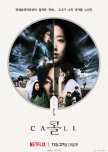
This review may contain spoilers
"Let me tell you the story about the call that changed my destiny..."
The plot of "The Call" as a thriller hinges on the protagonist doing profoundly stupid things to initiate and prolong the conflict between herself and the victim-turned-antagonist. So much that suspension of disbelief fractures the closer the film gets to the end. The lack of rules established for its time travel do what most time travel films do: Throw ideas, like feeling past-tense pain, at the wall.What started out as a cut-and-dry time travel narrative about two women connecting across time, and one of them dealing with an abusive and superstitious mother (whose abuses end up being justified by the story, ffs!), quickly devolves into run of the mill thriller with lot of shrieking and yelling women.
On top of that, the ending invokes a kid kicking a monopoly board and screaming, "You didn't win! You didn't win!" when they're caught cheating. By all means, end on a bad note. But make sure you've actually built a narrative that justifies that sour note, otherwise you risk exposing weak storytelling (which this ultimately is full of).
Performances are decent, and its entertaining enough that it kept me engaged. Overall? Nothing remarkable (especially in terms of time travel movies).
Was this review helpful to you?
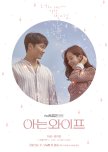
This review may contain spoilers
A Fairly Frustrating Experience When Rooting for the Heroine
[Written 2/2/2021]Time travel often asks, "If you could change anything in your life, what would it be?" Time travel romance loves to ask, “If you could trade one sweetheart for another, would you do it?”
The moral quandary of romance and time travel focusing on the idea of "fated lovers", typically ask us to sympathize with men who pursue women they like, all while discarding the agency of the female protagonist (who becomes an object or prize won at the end of the story). Temporal romances range from troubling to creepy when you start to think about the consequences of the characters actions.
Going into "Familiar Wife", the summary didn’t exactly promise a thrilling story. It sounded like your usual “husband hates wife” story that relies on broad stereotypes and revels in its sexism.
The show's first three episodes are hard to watch. Our lead is an emotionally unavailable and dismissive husband (Ju-Hyeok) who can't find the time to be present for his wife (Seo Wu-Jin), and their newborn baby. The writing (intentionally) paints the exhausted Wu-Jin as the monstrous wife who spits, and throws things at her husband like the nagging wife from a Shonen anime.
We're never really given the opportunity to see Wu-Jin's side of their relationship (divorced from Ju-Hyeok's perspective entirely), and, it’s at this point I start asking questions of the narrative. "What exactly are you saying about this woman?" Because sympathy was the last thing I felt for Ju-Hyeok. I wasn't exactly buying the idea that Wu-Jin was at all at fault, only that she was pushed to her absolute limit after being ignored for so long.
Still, the series does a fairly decent job of painting a believable picture of how a (somewhat) healthy relationship could deteriorate as badly as theirs did. But the overall impression you're left with as a viewer is that Ju-Hyeok hates his wife and can’t wait to dump her.
Like that pivotal moment in "About Time”, he trades one life for another to chase his ideal girl without consideration to the people around him. It's gross, but it only drives home how awful the character is at this point. The series focuses on the shallow emotional and material gains of Ju-Hyeok's new life, and how it impacts the people he knew.
While the credit union scenes veer into corporate piety (butt-kissing and groveling to the ninth degree), I think the show had a solid group of supporting characters. Most of them have little no impact on the greater narrative, while minor characters outside the bank and their dynamic with supporting characters don't do enough beyond fill in the time between Ju-Hyeok enjoying or hating his new life.
The positive for me is Wu-Jin's (somewhat) brand new life as a single woman. Unfortunately, the show doesn't do enough with her to sell the idea that this is a story about two people as opposed to just one man living out a fantasy. Her relationship with former sister-in-law is great, but it’s largely kept at a minimum.
Wu-Jin's troubled relationship with her elderly mother is full of strife, but the writing isn't interested in dealing with her dementia so much as using it to infantilize her. And because there wouldn't be a show without it, Wu-Jin is becomes her former husband's co-worker. Most of the tension in the show rests in how Ju-Hyeok struggles to accept the idea that he mistreated Wu-Jin and that she's probably better off without him.
"Familiar Wife" is an attempt to earn the idea that its protagonist can be rehabilitated and become a better person. That the grievances of the wife are warranted, not the butt of a sexist joke. For the first six episodes, I was buying into the premise. The performance of Ji Sung was strong enough that I could believe that Ju-Hyeok began to regret his previous life choices. And when the eighth episode dared to posit he couldn't undo his wish, I was prepared to give "Familiar Wife" all the stars.
But only if the show didn't throw Wu-Jin back under the bus as his reward. I was fully committed to seeing the two become friends (eventually). But a romantic couple (again)? No, sir. The story did too good of a job convincing me that Ju-Hyeok lost any and all right to that avenue.
I wanted the show to explore his new ties and family. But, the last episodes that I bothered to watch backtracked and ultimately reminded me that I wasn't going to get a story like "On Your Wedding Day".
A character moving on from his mistakes, and learning to live with them, was simply not in the cards. The narrative slowly devolved into the story of how Ju-Hyeok and Wu-Jin find their way back to each other. And all after he stalks Wu-Jin (played up in a romantic montage of him "being there" for her!), and meddling in her personal life to the point where he tries to bully a potential suitor out of the picture.
Most of it is for laughs (and some of it is definitely funny), but it's hard to take the show's premise at face value when Hye-won (Ju-Hyeok’s new wife) is characterized almost identically to how Wu-Jin was at the beginning of the series. There's no real effort to actually create a relationship between Ju-Hyeok and Hye-Won. The show actually strives to make sure that she's never given the same consideration as Wu-Jin. The show does a complete 180 characterization from soft-spoken, considerate cellist to a music teacher who's only personality traits is that she's rich and spoiled.
Her storyline, independent of Ju-Hyeok, is interesting, but it's definitely there to "both sides" issues in her marriage to Ju-Hyeok (since she considers cheating on him in light of his emotional neglect).
Ju-Hyeok effectively repeats the same pattern that landed in him in an alternate future, but this time the show asks us to root him (I'm actually not even sure if ever stopped asking. I was never in his corner). The last episode I watched doubled down on the "they're fated to be together" shtick, and every positive feeling I had for the show ultimately withered away in resignation.
Even reading the summaries about the last six episodes did nothing to convince me to pick the show up again.
Was this review helpful to you?
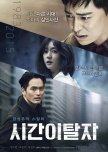
This review may contain spoilers
A Messy Time Travel Story That's Pretty Fun
With a title that invokes invokes 90s fare like "Timecop" or "Sudden Death", Time Renegades is not quite the sci-fi/action B-movie of Jean Claude Van Damme's career peak (but its got that spirit, for sure).Butterfly Effect time travel lay the crux of the film's narrative, which follows a music teacher from the 80s and a detective in the year 2015, attempting to prevent the deaths of 49 students and several women.
Like "Timecop", both characters are driven to save a woman they care about from (certain) death, but the story isn't so predictable that you'll be counting the story beats in chronological order as they come along, but they kinda come out of left field most of the time.
I think the most surprising thing about the story is that the detective actually admits to dreaming about the past like it's the most natural thing in the world, and none of his co-workers call him 'crazy' or 'psycho' (as you do in this genre). They just kinda say, "That's weird, but okay", and go about their day.
Like most K-dramas that introduce a serial killer element into their plot, the writing goes hard on the melodrama (to the detriment of the film), and the villain comes off as unintentionally comedic as the actor mugs, shrieks, and widens their eyes to communicate the character's madness.
The film's tone flip-flops between deadly serious and sustained bouts of comedy (mostly performed by Lee Jin-Wook), all of which is sandwiched between schmaltzy romance and conversations about reincarnation.
"Time Renegades" is a good time for the most part. It's time travel aspect isn't overly flashy, certainly makes a mess of its story (and to such a degree the time travel aspect is really treated like a get-out-of-jail-free card), but the performances are solid, and I think (sans the ending) the story is worth your time.
Was this review helpful to you?










